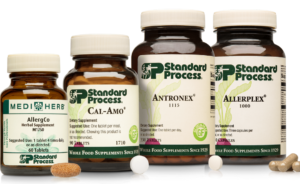By Claire Bacon, ACN, CNC
“Histamine” is an internal chemical that is responsible for our itchy, watery eyes and drippy sinuses we have come to expect during allergy season. We are all familiar with “anti-histamines” – the over-the-counter drugs that ease our symptoms. But are they a good idea in the long term? Should we consider other options for managing histamines long-term?
Antihistamines are relatively safe – when used in low doses for a short time only. When they do produce side effects, they tend to go away quickly after the drug wears off. However, many people use “non-drowsy” antihistamines for weeks or months; for some, even years! A few forms are linked to acute liver injury (cyproheptadine, and cetirizine). But why even take the risk, when there are many natural options you could pursue?
This discussion on managing histamines applies to just about anything that might get your sinuses going – even year round. If your eyes get itchy and teary around your best friend’s pet, if you keep sneezing for days after clearing out dust and Spring cleaning, or if certain inflammatory foods get your nose running… you’ve got a problem with histamines!

How Does Histamine Affect the Body?
Histamine is the substance produced by the immune system and the liver to fight the foreign invaders — the allergens. In its efforts to protect your body and capture the allergen, histamine causes inflammation of the eyes, skin, nasal cavities, throat and more.
Your immune system goes on high alert when you come in contact with an allergen, which launches a biochemical chain reaction. The immune system signals to the mast cells to release histamine and other substances during allergic reactions. Upon leaving the mast cells, histamine increases blood flow in the areas affected by the allergen, causing heat, redness, and/or inflammation.
Histamine locks into the receptors in the mucus membranes. If the allergens affect your nose, histamine will prompt the nasal membranes to produce more mucus. If the allergens affect your throat, your eyes, or your gut, you may experience a variety of symptoms in different ways. Allergy testing may reveal clues to how you can best approach managing histamines.

Why Does My Body Make So Much Histamine?
Levels of histamine in the body shift based on the speed at which your body processes it. Eating a high-histamine food (or more than one of these foods at the same time) may be enough to cause symptoms one day, but may not be enough to do so on a different day. Therefore, we have to think in terms of “have you had an inflammatory week” versus “did you have an inflammatory meal?” You could say, the inflammation bioaccumulates.
Histamine intolerance is due to a deficiency of the gut enzyme “diamine oxidase” (DAO), which causes the natural histamine you eat not being broken down and absorbed well within the GI tract. Typically, we find that chronic allergy sufferers tend to have a very sensitive or somewhat “leaky” and reactive gut lining. They may have had prior exposures to mold or other pathogens that have set up shop and not been eliminated by the immune system.
If you feel you’re having an extended duration or overreaction of sinus symptoms beyond your “typical” level of allergies, be sure to investigate other possibilities. There could be a colony of mold or yeast hidden under biofilms in your gut or your sinuses. You could have undiscovered food sensitivities. Or, it could be some other trigger in your home activating the mucus membranes. Finding the root cause is the key to managing histamines!

What Foods Are High in Histamine?
In our nutrition consults, we are always trying to match people up with the therapeutic diet that is uniquely best for them. If your inflammation is showing up as an autoimmune condition, we suggest the AIP diet. For people with seizures and neurological issues, we recommend a Ketogenic or GAPS diet. If you are struggling with liver and gallbladder issues, we recommend a beet-heavy liver detoxification diet. And if you have chronic allergies, we recommend a Low Histamine diet – especially during allergy season!
It is not common sense to know that certain foods release histamines more than others. Likewise, no one really knows (unless you study this) that some foods impair your ability to create the DAO enzyme that naturally breaks down histamine. Because of this, some “healthy” foods are actually quite problematic to the allergy sufferer. We have compiled a short list handout based on lengthy published data to identify which foods could worsen symptoms, and which ones are “safe”. Most surprising on the list may be: spinach, avocado, citrus fruit like strawberries, and fermented foods. Click the link to the handout and keep it in your purse!
When you know better, you do better!

Herbal and Nutritional Strategies
Everyone should know by now, Mother Nature has literally given us everything we need to support a healthy immune system. Usually, we just need to provide the necessary nutrients, and remove all interferences. With that, the body should be able to do what is needed. Here are some of the most proven herbs and supplements to help with histamine balance:
- Black Cumin Seed Forte and Black Seed Oil – “the cure for everything but death”.
- Nettles – helpful to stabilize mast cells.
- NAC – supports detoxification as a glutathione precursor
- Histoplex AB – a fantastic blend of herbal defenses against airborne allergies.
- Quercetin – helps stabilize mast cells.
- Calcium Lactate – helps to fuel the white blood cells (your “army”)
- Vitamin D – general immune support
- Essential fatty acids, like EPA and GLA. One of our favorite sources of EFAs is Cod Liver Oil. Tried and true over generations!
Supplement Highlight

Allerplex is a combination of a few different products, most importantly Betacol and Antronex. This is a convenient multivitamin for the allergy-sufferer that combines different beneficial actions in a single product.
Antronex – This is a beef liver fat extract that increases cirulation through the liver, to flush out excess histamines. Antronex allows your body to quickly release toxins that trigger allergy responses.
AllergCo is a blend of herbs traditionally used to treat allergic conditions. It contains Black Cumin Seed (Nigella), Chinese Skullcap, and Albizia. This product helps to relieve allergy symptoms and maintain normal respiratory tract function. Available in office only.
Cal-Amo is our favorite “system acidifier”. It is helpful to acidify the gut environment, which prevents yeast overgrowth that can cause irritation and inflammation. As we know the mucus membranes in the gut are the same as the mucus membranes in the sinuses, an inflamed gut means inflamed sinuses.
Sinus Forte – contains Eyebright, Golden Rod, Echinacea, Golden Seal and Cayenne to support the nose, sinuses and healthy upper respiratory mucous membranes. Basically, if you have just about any issues with your mucus membranes, this is a good one for healing and getting your immune system right!
Final Thoughts
Natural herbs and nutrients ideally should be part of your healthy lifestyle every day. It is hard to depend on natural remedies at the last minute. You can’t just take one dose of an herb and all your problems are instantly solved; herbs don’t work like that. Rather, it’s the daily maintenance of healthy inflammation levels that will improve your health to where you want to be. Managing histamines is a daily challenge until the pollen leaves the air. If you tend to have nasty allergies in April, we highly recommend you get started working on it in March!
Wishing you the best in vibrant health!


